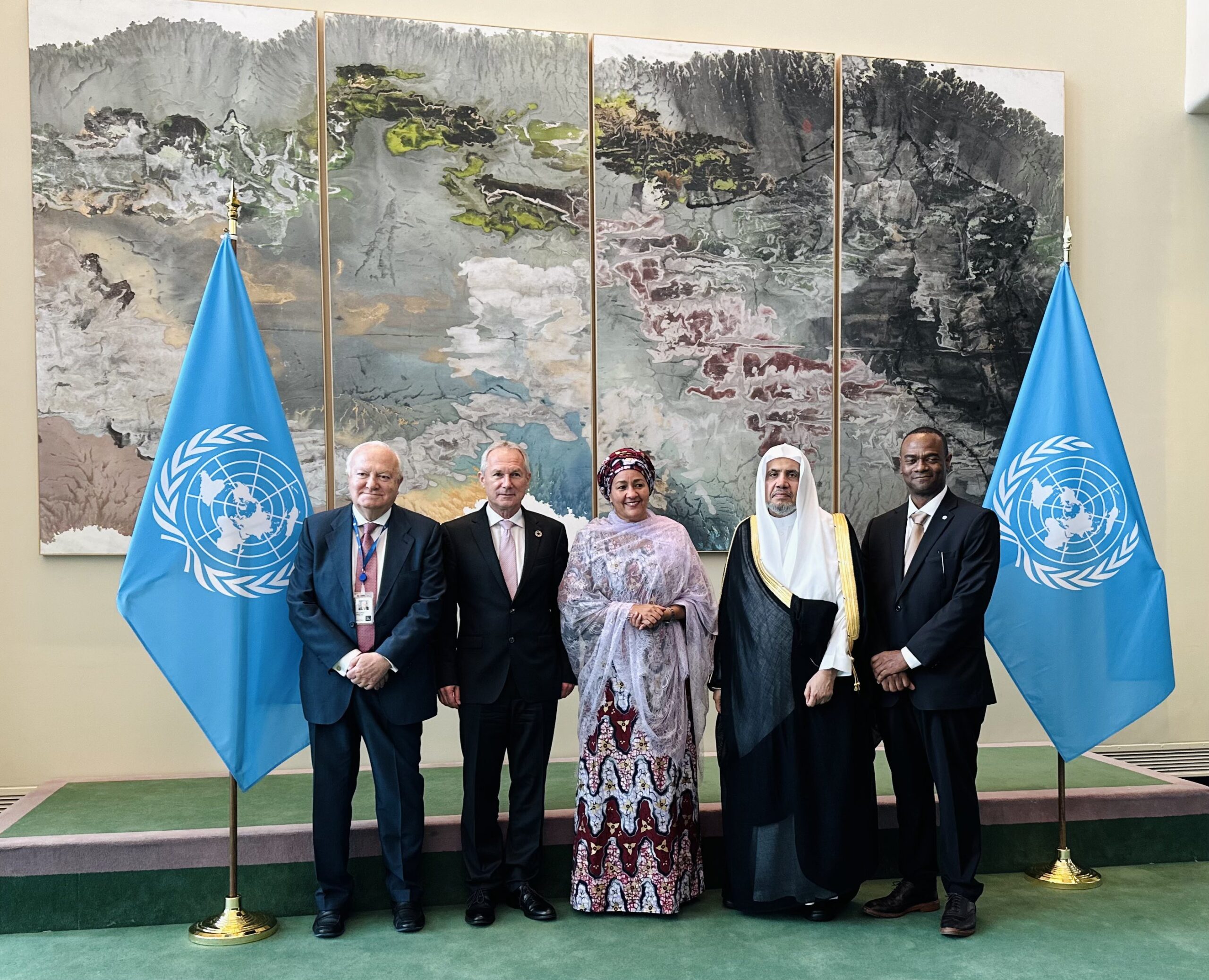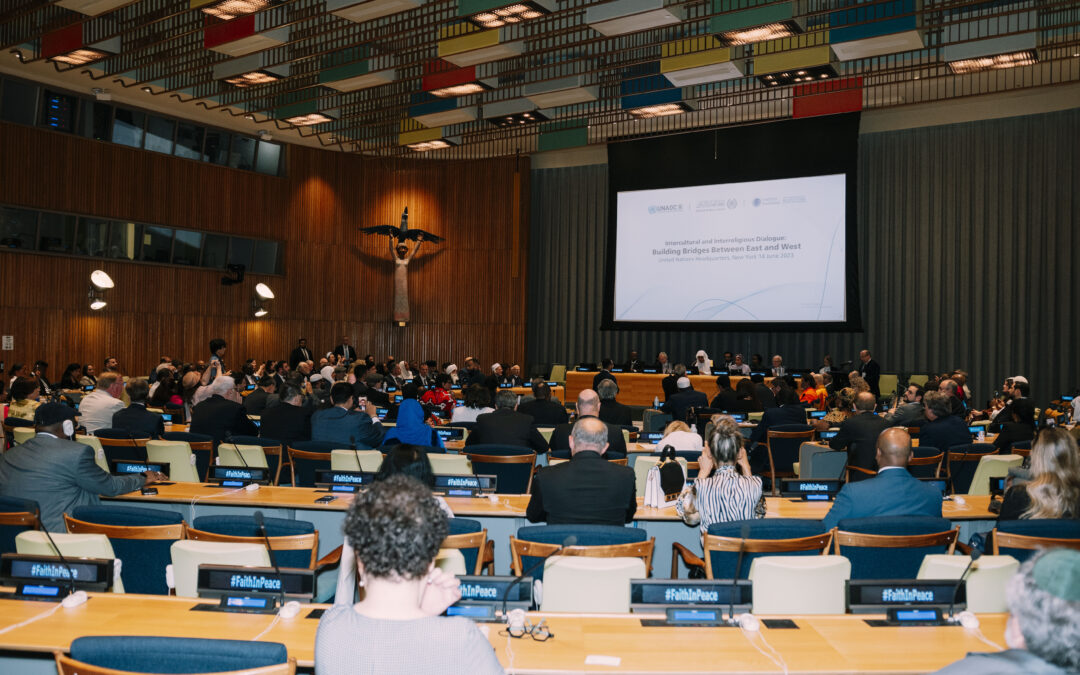Remarks by the High Representative for UNAOC
Intercultural and Interreligious Dialogue: Building Bridges Between East and West
Trusteeship Council, United Nations Headquarters, New York, 14 June 2023
Your Excellency Mr. Csaba Korosi, President of the General Assembly,
Your Excellency Ms. Amina Mohamed, Deputy Secretary General,
Your Excellency Sheikh Dr. Mohamed AbdelKarim Al-Issa,Secretary-General of the Muslim World League,
I wish to start by welcoming Dr. Al Issa to the UN headquarters in New York. I am very pleased that we are supporting this event dedicated to interreligious and intercultural dialogue as a tool to build bridges between East and West.
Building bridges of understanding between diverse cultures, religions and civilizations is the raison d’etre of the United Nations Alliance of Civilizations.
It is truly heartwarming to see that after 18 years of the birth of the United Nations Alliance of Civilizations, state and non-state actors are increasingly recognizing the power of interreligious and intercultural dialogue as a viable tool for creating cohesive, homogonous, peaceful and inclusive societies.
A society that is rich in its diversity.
A society that is strong in its inclusivity and respect for each and every individual regardless of their religion, faith, color, ethnicity or gender.
A society that is just in its protection of all its citizens rights, equally and without discrimination.
These are the basis of building peaceful societies.
These societies would rightly be characterized as ideal societies.
Sadly, this is not the real world.
Around the world, the surge of hate speech, xenophobia and religious intolerance have created mistrust between people and alienated entire communities.
Bigotry, racism and stigmatization based on religion, belief, ethnicity, race or gender thrive in chaotic societies.
Where toxic hate thrives, radical groups and terrorists find a fertile ground to divide people and recruit the vulnerable and marginalized.
During the pandemic and to date there has been an unprecedented increase in online activity and proliferation of digital platforms which was a multiplier factor enabling hate mongers and broadening their outreach and their influence across the digital platforms.
Neo-Nazi and white supremacist movements are gaining both strength and traction.
They have become the fastest growing security threat in many countries.
We have seen how these far-right groups have evolved and morphed since Christchurch, New Zealand in 2019.
Their targets were children in schools, worshippers in places of worship and shoppers in grocery stores.
The perpetrators harboring extremist ideologies, were exalted for their killings on digital platforms.
This dramatic event convinced Secretary-General to launch the UN Global Plan to Safeguard Religious Sites that my entity was tasked to draft. This Plan contemplates the proposal to call for an international conference to protect religious places.
Hate and extremism knows no country. It is everywhere.
Excellencies,
Distinguished guests,
As the deputy Secretary General rightly mentioned in her remarks, the dialogue we need now is not only between East and West but between all corners of the world.
The current geopolitical scene makes this such dialogue imperative.
There is a great deal of mistrust and fear among people and between nations.
This is where dialogue builds trust.
That’s why the United Nations General Assembly in several resolutions has recognized intercultural and interreligious dialogue as an important tool for promoting mutual respect, understanding and compassion.
Distinguished guests,
Thirty years ago, in 1992 Samuel Huntington issued his theory of the “clash of civilizations”. the American scientist prophesied that the great divide between humanity and the predominant source of conflict will be cultural and/or religious.
He identified the Islamic civilization as the main political and cultural adversary of the West. Nine years later, his thesis found resonance after the 9/11 terrorist attacks. The scene of the total collapse of the twin towers changed the perception of the Huntingtonian prophecy which was re-evaluated by the West believing that they had found their new enemy: Islam.
The Alliance of Civilizations was created in a way to refute the theory. We are convinced that religion, culture or civilizations are not the only root causes of conflicts. It must be stated bluntly: there is no clash of civilizations. There is a clash of ignorance and a clash of interests.
Quite often identities were abused and misused. Identities, in fact, could be forces for public good.
Violent extremism and terrorism should not be associated with any religion or faith.
Religion is, was and continues to be a major positive force in our lives.
Religious leaders have an important role to play in changing the religious discourse. In mobilizing the communities towards mutual respect and compassion.
To defeat the clash of ignorance, we need to invest more in dialogue, to listening to each other including those who differ with us.
Distinguished guests,
Let’s continue to provide a safe space for a meaningful dialogue and to build bridges of understanding instead of walls of division.
One of the most important Italian writer, Erri De Luca in one of his latest books dedicated to the youth said, and I quote: “There are two possibilities for the future generations: either to be the generation of bridge (to build, to unite, to put together societies), or the generation of dam” where we isolate ourselves, we protect ourselves…but in the end, the forces of evil inundate everything…
Here today we call for society of bridges, to create spaces for respect and fraternity.
Let us work together to make the voice of reason louder than the sounds of guns.



